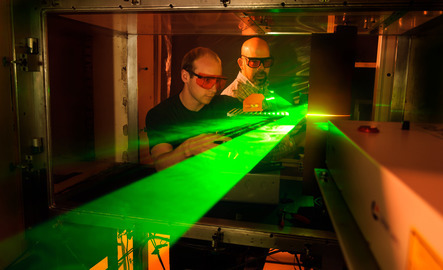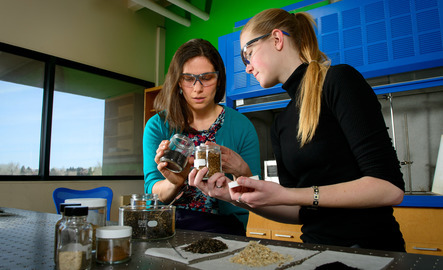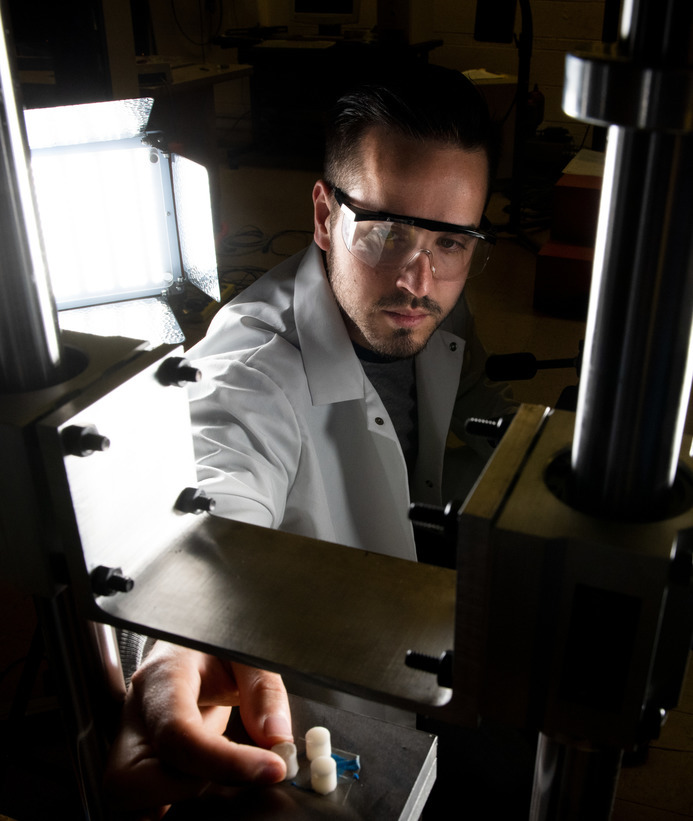About Mechanical Engineering at UW
M.S. Admissions Requirements:
- Applicants should possess a Bachelor of Science (B.S.) degree or equivalent in Mechanical Engineering with a minimum GPA of 3.000 on a 4.000 grade scale or equivalent.
- Students that do not hold B.S.M.E. degrees may qualify as M.S. candidates by completing, without credit, certain prerequisite courses as specified by the Department.
- A minimum composite score of 294 on the Verbal and Quantitative sections of the GRE.
- For international students, a minimum TOEFL score of 90 on the Internet-based test (iBT) (or a minimum IELTS score >= 6.5 or a DuoLingo >= 110).
- For students currently enrolled in the BS-ME program at UWYO we offer a Quick Start B.S./M.S program that allows completion of the BS and MS degrees in 5 years.
On the online application form, you will need to provide:
- Resume
- Copy/scan of academic transcript
- Copy/scan of GRE scores
- For international non-native English speaking applicants: copies of TOEFL (or IELTS or DuoLingo) results
- Contact information for 3 academic/professional references
- Statement of Purpose indicating the applicant’s technical area of interest, abilities
and objectives in completing a graduate degree in mechanical engineering.
Applications are welcome all year but to be considered for teaching assistantships,
applications must be submitted before March 15 for the fall semester or October 15 for the spring semester.
Learn more about the graduate program application requirements and process.

The master's program in mechanical engineering offers four concentrations for students
to specialize in. These concentrations allow students to focus on specific areas of
interest within the field of mechanical engineering and gain expertise in those areas.
Whether a student is interested in the mechanics of materials or the fluid dynamics
of aerodynamics, the program provides the opportunity to develop a specialized skillset
that can lead to a successful career in the field.
Concentrations
- Materials Science and Mechanics
- Fluid Dynamics and Aerodynamics
- Renewable Energy
- Energy Conversion and Combustion

What Can You Do With a Mechanical Engineering Master’s Degree?
A master’s degree in mechanical engineering can open the door to advanced roles in design, research and leadership across industries like aerospace, automotive, energy, robotics and manufacturing. Graduates often work as senior mechanical engineers, project managers, research and development engineers, systems engineers or specialists in areas like thermal systems, robotics or computational modeling. The degree can also lead to roles in academia, government research or consulting and provides a strong foundation for doctoral study or interdisciplinary careers in fields such as biomechanics or renewable energy systems.
- Senior mechanical engineer
- R&D engineer
- Project manager
- Systems engineer
- Thermal systems specialist
- Robotics engineer
- Computational modeling analyst
- Aerospace or automotive engineer
- Engineering consultant
- University instructor or researcher
UW mechanical engineering M.S. graduates have gone on to work or pursue doctorates at the following:
- PACCAR
- Southwest Research Institute
- Naval Air Weapons Station
- Mighty Oak Medical
- Lockheed Martin
- OXY
- SRAMM, LLC
- ESPEC North America
- Envision Energy
- North America Natural Power
- Intel Corporation
- Stryker
- University of Houston
- University of New Mexico
- University of Wyoming
A master’s in mechanical engineering offers several key benefits. It can lead to higher-paying, more specialized roles and open doors to leadership positions in research, design and project management. The degree deepens your technical expertise in areas like robotics, energy systems, thermal science and computational modeling. It also gives you a competitive edge in a crowded job market, increases your potential for career advancement and provides a strong foundation for doctoral study or interdisciplinary work in fields like biomechanics or renewable energy.
Yes, a master’s in mechanical engineering is often worth it—especially if you're aiming for advanced technical roles, leadership positions or higher earning potential. It can set you apart in a competitive job market, provide deeper expertise in specialized areas like robotics, energy systems or computational modeling, and open doors to research, consulting or academic careers. It’s particularly valuable if you want to transition into cutting-edge industries, move up the career ladder or prepare for a Ph.D.
Gain a Once in a Lifetime Education
The University of Wyoming's College of Engineering and Physical Sciences offers graduate students an exceptional balance of rigorous academics, hands-on research and real-world experience. Small class sizes and dedicated faculty foster a supportive learning environment, while UW's emphasis on affordibility ensures you can pursue a top-tier education without overwhelming debt — all in the stunning setting of the Rocky Mountains.
"Completing a Master of Science degree in Mechanical Engineering at UW was an outstanding way to expand my engineering education. It was an affordable, challenging, and rewarding experience that ultimately helped prepare me for my career in the aerospace industry."
- David Tobin | Electromechanical Engineer at Lockheed Martin | BSME Class of 2018 | MSME Class of 2020


